冷静应对拒稿:如何回复审稿意见
如何应对学术论文的审稿意见合理回应与修改建议
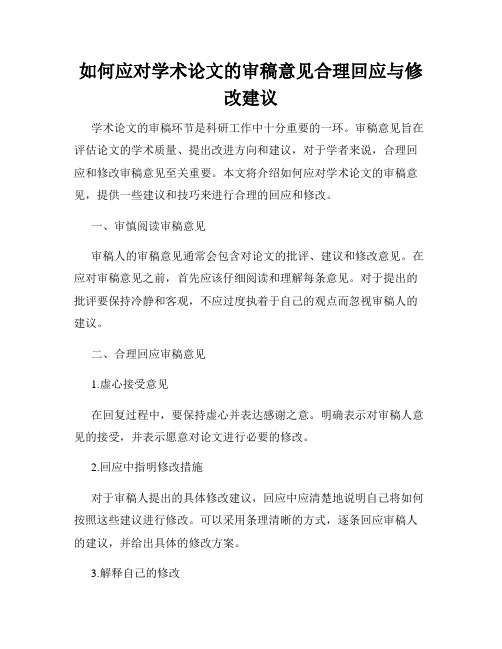
如何应对学术论文的审稿意见合理回应与修改建议学术论文的审稿环节是科研工作中十分重要的一环。
审稿意见旨在评估论文的学术质量、提出改进方向和建议,对于学者来说,合理回应和修改审稿意见至关重要。
本文将介绍如何应对学术论文的审稿意见,提供一些建议和技巧来进行合理的回应和修改。
一、审慎阅读审稿意见审稿人的审稿意见通常会包含对论文的批评、建议和修改意见。
在应对审稿意见之前,首先应该仔细阅读和理解每条意见。
对于提出的批评要保持冷静和客观,不应过度执着于自己的观点而忽视审稿人的建议。
二、合理回应审稿意见1.虚心接受意见在回复过程中,要保持虚心并表达感谢之意。
明确表示对审稿人意见的接受,并表示愿意对论文进行必要的修改。
2.回应中指明修改措施对于审稿人提出的具体修改建议,回应中应清楚地说明自己将如何按照这些建议进行修改。
可以采用条理清晰的方式,逐条回应审稿人的建议,并给出具体的修改方案。
3.解释自己的修改在回应中,可以适当解释自己对修改的理解和考虑。
如果在某些地方没有按照审稿人建议进行修改,可以说明原因,并提出自己的理由。
但要注意不要过于辩解,避免过度争论。
4.尊重审稿人意见尽量避免批评和质疑审稿人意见的偏见或错误,而是应该以尊重的态度对待审稿人的意见。
虽然有时审稿人的意见可能有限或存在不一致,但作为学者,应该坚持以开放的心态来对待他们的意见。
三、合理修改论文1.针对审稿意见进行修改根据审稿人的具体意见,结合自己的研究经验和观点,对论文进行合理的修改。
在修改过程中,要严格遵循学术规范和论文写作要求。
2.修改思路和结构如果审稿人对论文的整体结构和思路提出了质疑或建议,应该认真考虑并做出相应的修改。
有时候需要对原来的论据和结论进行重新梳理和调整。
3.修正语言和文笔问题审稿人可能会对论文的语言和文笔提出意见。
在修改过程中,要注意论文的语言表达是否准确、简明扼要。
消除语法错误、调整句子结构和词汇使用,以提高论文的可读性和可理解性。
如何有效回应审稿人的意见

如何有效回应审稿人的意见在学术研究和出版领域,面对审稿人的意见并给出有效的回应是至关重要的一环。
这不仅关系到论文能否顺利发表,更体现了作者对待学术的严谨态度和专业素养。
那么,如何才能有效地回应审稿人的意见呢?首先,要以正确的心态对待审稿人的意见。
审稿人的目的不是刻意刁难作者,而是帮助提高论文的质量和学术价值。
因此,作者应怀着感激和尊重的心态来审视这些意见,将其视为改进论文的宝贵机会。
在收到审稿人的意见后,第一步是仔细阅读和理解每一条意见。
有些意见可能比较直接和明确,比如要求补充实验数据、修改论证逻辑或修正语法错误。
而有些意见可能较为含蓄或宏观,需要作者仔细琢磨其背后的意图。
对于不明确的意见,不要急于猜测,而是可以通过邮件等方式与编辑沟通,确保自己准确把握审稿人的关注点。
接下来,对审稿人的意见进行分类整理。
可以将其分为必须修改的关键问题、建议性的改进意见以及可选择性考虑的问题。
对于关键问题,要给予最高的重视,投入足够的时间和精力去解决。
对于建议性的意见,要认真思考其合理性,并根据自己的研究和论文整体框架,决定是否采纳。
对于可选择性的问题,可以根据实际情况权衡其对论文质量的影响。
在回应审稿人的意见时,要做到条理清晰、逻辑严密。
可以采用逐条回应的方式,确保每一条意见都得到了回应。
在每条回应的开头,明确指出是针对哪一条意见进行的回复,例如“针对审稿人提出的第一条意见……”。
在回复中,要清晰地说明自己采取的措施或解释自己的观点。
如果进行了修改,要具体说明修改的内容和位置;如果不同意审稿人的意见,要礼貌且有理有据地阐述自己的理由,但同时也要表现出愿意进一步探讨和接受合理建议的态度。
回应的内容要具体而有针对性。
避免使用模糊、笼统的语言,比如“已进行修改”,而要详细说明如何修改,例如“增加了新的案例分析,以进一步支持文中的观点,相关内容在第 X 页第 X 段”。
如果需要补充数据或引用新的文献,要准确说明来源和作用。
学术期刊投稿指南如何回应审稿人意见和修改论文

学术期刊投稿指南如何回应审稿人意见和修改论文学术期刊是研究人员发表研究成果、交流学术思想的重要渠道。
然而,投稿后接受审稿人的意见和修改论文是非常常见的过程。
如何回应审稿人的意见和修改论文,成为作者们需要掌握的重要技巧。
本文将介绍一些有效应对和回应审稿人意见的方法,以帮助作者更好地修改论文。
一、审慎阅读审稿意见接到审稿人的意见后,作者应该保持冷静并审慎阅读意见。
首先,作者应仔细阅读审稿人对论文的评语和建议,确保自己对意见的理解是准确的。
其次,作者应将审稿人的意见整理成清晰的列表,以便于后续的处理和回应。
最后,作者应将审稿人的意见和自己对稿件的理解进行对比,找出审稿人提出的问题和改进要求。
二、积极回应审稿人的意见在回应审稿人的意见时,作者应积极回应,并以开放的心态对待审稿人的批评和建议。
首先,作者应感谢审稿人给予的指导和意见,表达自己的欣赏之情。
其次,作者应直面问题,对审稿人提出的批评进行认真思考,找出作者在论文中存在的不足之处。
接着,作者应针对审稿人的意见,提出具体的改进方案,并说明改进措施。
最后,作者需注意在回应中保持谦逊和客观,对审稿人的意见给予充分的尊重和回应。
三、合理修改论文回应审稿人的意见后,作者需要对论文进行相应的修改。
在修改过程中,作者应审慎考虑并充分落实审稿人的意见和建议。
首先,作者需要对审稿人提出的每一个问题和建议进行回应和改进。
其次,作者应对修改后的论文进行全面的编辑和校对,确保修改的准确性和一致性。
此外,作者也可以适当进行补充和完善,以进一步提升论文的质量和可读性。
最后,作者应注意格式的整理,确保论文的排版整洁美观。
四、撰写回复函回应审稿人的意见后,作者需要撰写回复函给予审稿人和编辑的回应。
回复函应该包括对每个具体问题的回应以及相应修改所做的解释和说明。
在撰写回复函时,作者应在信中体现出对审稿人的感谢和对审稿人建议的重视,同时清晰地阐述自己对于审稿人的意见的回应措施。
此外,作者需注意回复函的语言要规范得体,措辞要准确清晰,以表达出作者的诚意和敬意。
如何回复审稿人意见

接着上一篇交流贴,这一次我想给大家分享一下我回复审稿人的一些经验。
根据个人经验,我将审稿人划分成三类人。
我对每一类人的回复方式是有差别的。
第一类人是像我这样的博士生。
跟着导师做课题,已经发表了几篇文章,导师是通讯作者。
审稿邀请发给导师后,导师转发给学生审稿。
从我自身出发,这一类人的特点就是有一点傲气,有点急功近利,审稿同行文章是带有非理性感情的。
很惭愧,我审过几篇稿,意见中也是带有偏见的。
现在感觉非常幼稚,我非常想对那些人说声抱歉。
其实这也是一个成长过程,经历过就不会再犯同样的错误了。
言归正传,其实这种审稿人是比较容易对付的。
对于这种人你的使劲把他往天上捧,然后尽量用商量的语句对付那些不好或者不可能回答的问题。
我觉得,一定不能不回答,即使不能回答编故事也是可以的。
为什么可以编故事呢?因为这一类人(包括我)实际上只是半罐子水,而且不一定完全了解你的方向,懂的东西不一定比你多。
像这样的情况,你就得发挥自己专长,尽量用专业的术语和分析绕圈子。
最后加一句,we deeply appreciate the reviewer's comment and would very much like to consider this direction of research in our future work. 或者说,This is an essential part of research which is currently under active development. 这样,一般都能糊弄过去。
下面是我如何回复这样审稿意见几个例子:第一个是说contribution不够significantAuthors would like to express our most sincere gratitude to the reviewers for your effort and patience in reviewing our manuscript (MS). We deeply appreciate your constructive comments that greatly help improve the technical quality and the presentation of this manuscript. Please also accept our apologies for not being able to present clearly the real contributions of the work. ( 先使劲捧他)然后再清楚的解释你的real contribution 。
如何应对审稿人意见并修改论文
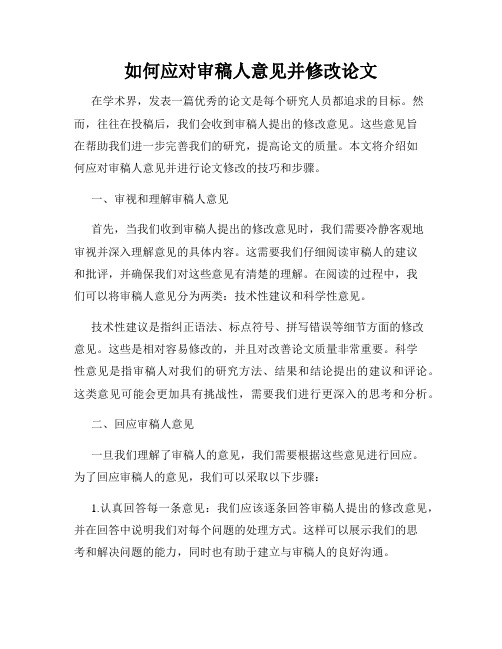
如何应对审稿人意见并修改论文在学术界,发表一篇优秀的论文是每个研究人员都追求的目标。
然而,往往在投稿后,我们会收到审稿人提出的修改意见。
这些意见旨在帮助我们进一步完善我们的研究,提高论文的质量。
本文将介绍如何应对审稿人意见并进行论文修改的技巧和步骤。
一、审视和理解审稿人意见首先,当我们收到审稿人提出的修改意见时,我们需要冷静客观地审视并深入理解意见的具体内容。
这需要我们仔细阅读审稿人的建议和批评,并确保我们对这些意见有清楚的理解。
在阅读的过程中,我们可以将审稿人意见分为两类:技术性建议和科学性意见。
技术性建议是指纠正语法、标点符号、拼写错误等细节方面的修改意见。
这些是相对容易修改的,并且对改善论文质量非常重要。
科学性意见是指审稿人对我们的研究方法、结果和结论提出的建议和评论。
这类意见可能会更加具有挑战性,需要我们进行更深入的思考和分析。
二、回应审稿人意见一旦我们理解了审稿人的意见,我们需要根据这些意见进行回应。
为了回应审稿人的意见,我们可以采取以下步骤:1.认真回答每一条意见:我们应该逐条回答审稿人提出的修改意见,并在回答中说明我们对每个问题的处理方式。
这样可以展示我们的思考和解决问题的能力,同时也有助于建立与审稿人的良好沟通。
2.解释争议问题的原因:如果我们对审稿人提出的某些建议持不同意见,我们应该在回答中解释我们的立场并提供支持。
这样可以促进审稿人对我们观点的理解,并可能改变其初步的看法。
3.合理修改和补充:在回答审稿人意见的同时,我们需要根据意见对论文进行相应的修改和补充。
我们应该尽可能地满足审稿人的要求,同时确保修改后的论文更加完善和具有说服力。
三、论文修改的技巧和注意事项除了回应审稿人意见外,还有一些论文修改的技巧和注意事项值得我们注意:1.保持冷静和客观:修改论文时,我们应该保持冷静和客观的态度。
不要因为审稿人的批评而产生情绪上的过度反应,而是积极面对问题并寻求解决办法。
2.精益求精:审稿人提出的修改意见是对我们研究的指导和提高的机会。
审稿意见怎么回复整理
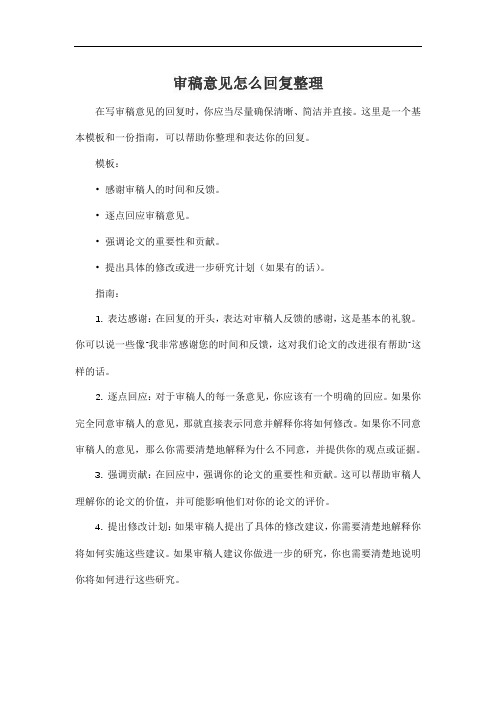
审稿意见怎么回复整理
在写审稿意见的回复时,你应当尽量确保清晰、简洁并直接。
这里是一个基本模板和一份指南,可以帮助你整理和表达你的回复。
模板:
•感谢审稿人的时间和反馈。
•逐点回应审稿意见。
•强调论文的重要性和贡献。
•提出具体的修改或进一步研究计划(如果有的话)。
指南:
1. 表达感谢:在回复的开头,表达对审稿人反馈的感谢,这是基本的礼貌。
你可以说一些像“我非常感谢您的时间和反馈,这对我们论文的改进很有帮助”这样的话。
2. 逐点回应:对于审稿人的每一条意见,你应该有一个明确的回应。
如果你完全同意审稿人的意见,那就直接表示同意并解释你将如何修改。
如果你不同意审稿人的意见,那么你需要清楚地解释为什么不同意,并提供你的观点或证据。
3. 强调贡献:在回应中,强调你的论文的重要性和贡献。
这可以帮助审稿人理解你的论文的价值,并可能影响他们对你的论文的评价。
4. 提出修改计划:如果审稿人提出了具体的修改建议,你需要清楚地解释你将如何实施这些建议。
如果审稿人建议你做进一步的研究,你也需要清楚地说明你将如何进行这些研究。
5. 避免争论:尽管你需要对你的论文的贡献和价值进行辩护,但你也需要避免与审稿人进行争论。
你的目标是让审稿人理解你的观点,而不是说服他们改变他们的观点。
6. 清晰简洁:你的回复应该清晰、简洁并直接。
避免使用复杂的语言或长句,尽量让你的回复容易理解。
记住,审稿人的反馈是宝贵的资源,他们帮助你提高你的论文的质量。
你应该尊重并认真考虑他们的反馈。
学术期刊投稿如何应对审稿人意见与修改稿件

学术期刊投稿如何应对审稿人意见与修改稿件学术期刊投稿是科研工作者将自己的研究成果发布于学术界的重要渠道之一。
在投稿的过程中,审稿人的意见和修改稿件是不可避免的环节,因此掌握应对审稿人意见和修改稿件的技巧是每个学者都应该掌握的能力。
本文将从三个方面来探讨如何应对审稿人意见和修改稿件。
一、积极回应审稿人意见审稿人对于稿件提出的意见是基于其学术经验和专业领域的知识,因此我们应该积极对待并认真回应审稿人的意见。
首先,我们要保持谦虚和开放的心态,对审稿人的批评建议保持开放的姿态,不要因为自己对研究的过度自信而忽略审稿人的意见。
其次,我们要认真分析审稿人意见的合理性和科学性,理解其意见的出发点和目的,尽量从审稿人的角度去审视自己的研究。
最后,我们要诚恳地回复审稿人的意见,提出自己的想法和解释,并且在回复中避免使用过于情绪化或争议性的措辞,保持专业和客观。
二、仔细修改稿件在回应审稿人意见的同时,我们还要对稿件进行仔细的修改。
首先,我们要对审稿人的批评和建议进行逐条细致的审视和分析,找出可以采纳的意见,并根据意见进行相应的修改。
其次,我们要重新检查论文的结构和逻辑,确保研究方法、数据分析和结果的准确性和合理性,并进行必要的修正和补充。
此外,我们还需要检查文献引用的准确性和完整性,确保自己的研究在相关领域的学术背景基础上进行。
三、提前规避审稿人意见在投稿前,我们可以通过一些策略来尽量减少审稿人对稿件的意见和修改。
首先,我们可以提前阅读目标期刊的投稿要求和审稿准则,对学术期刊的发表标准和审稿人关注的重点有所了解,以便在投稿之前就能够对文章的结构和内容进行合理的安排。
其次,我们要从审稿人的角度出发,仔细检查自己的研究并尽量减少研究中可能存在的问题和漏洞。
最后,我们可以请教领域内的专家和同行,提前进行同行评议,尽量在投稿前解决一些可能存在的问题和疑惑。
综上所述,学术期刊投稿过程中,应对审稿人意见和修改稿件是一个不可或缺的环节。
发表论文时如何回复审稿编辑的意见

发表论文时如何回复审稿编辑的意见不管发表哪类期刊,基本都会有一个修改的过程。
一般来说,杂志社会有专门编辑对所有投稿文章审稿。
这个审稿会分两步进行,第一步先选择能够发表的文章,只要过了这一步,大概率算是成功了。
随后审稿编辑会对这些文章进行详细审稿,给出具体的修改意见。
这个修改意见可能是格式上的问题也可能是内容上的,其目的是为了提升论文质量,并不是故意为难你。
下面我们主要谈完成修改后,如何回复审稿编辑。
首先,不论审稿人提了什么意见,你在回复的时候,第一句话一定要说:“谢谢您的建议,您的所有建议都非常的重要,它们对我的论文和科研工作都具有重要的指导意义!”其次,就是如何回答审稿人意见也要讲究一些方法技巧:1.不遗漏任何意见,不管是期刊编辑或是同行评审员提出的。
要确认编辑和审稿人提出的所有意见都有回复到,即便是不同意或是没有采纳修改的意见也要说明原因。
2.逐点回复。
可以将审稿意见进行编号,然后顺序回复,标示论文中进行的修改,或是指出修改前后的页码与行数,另外,为了更好区别意见和回复,审稿意见可以使用粗体字。
3.分类审稿意见。
如果审稿意见很多,可以进行分类,比如与方法相关的归成一类、语言相关一类等等,如果进行分组的话,记得要在信里说明。
4.将段落式的评审意见拆成点列式。
如果审稿意见是长长的段落,那么不妨将它分离成点,个别回应,如果有不确定的意见,可以在回复前解释你的理解再进行回复。
5.审稿人的意见明显有问题,可以礼貌地厘清。
你必须据理力争。
但是,你一定不能说:“审稿人先生,我认为你的意见是错的!”你不必对他的意见发表任何的评论,只需要列出你的理由和证据就可以了,结尾也不要强调你的观点是正确的。
简单说就是“既不说你对,也不说我对,证据说话”。
6.遇有无法处理的意见,记得说明原因。
有时候审稿人会要求额外的数据或是补做实验,而你会认为没有必要或者暂时无法做到,即使如此,还是要说明不做的原因,类似经费不够或没有时间这种私人的理由要尽量避免,不要摆出一大堆理由来证明这个意见是不好实现的。
如何正确回复论文审稿人意见
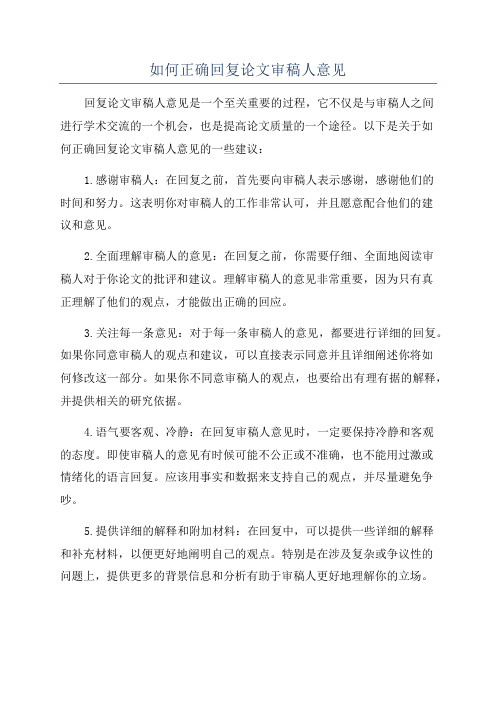
如何正确回复论文审稿人意见回复论文审稿人意见是一个至关重要的过程,它不仅是与审稿人之间进行学术交流的一个机会,也是提高论文质量的一个途径。
以下是关于如何正确回复论文审稿人意见的一些建议:1.感谢审稿人:在回复之前,首先要向审稿人表示感谢,感谢他们的时间和努力。
这表明你对审稿人的工作非常认可,并且愿意配合他们的建议和意见。
2.全面理解审稿人的意见:在回复之前,你需要仔细、全面地阅读审稿人对于你论文的批评和建议。
理解审稿人的意见非常重要,因为只有真正理解了他们的观点,才能做出正确的回应。
3.关注每一条意见:对于每一条审稿人的意见,都要进行详细的回复。
如果你同意审稿人的观点和建议,可以直接表示同意并且详细阐述你将如何修改这一部分。
如果你不同意审稿人的观点,也要给出有理有据的解释,并提供相关的研究依据。
4.语气要客观、冷静:在回复审稿人意见时,一定要保持冷静和客观的态度。
即使审稿人的意见有时候可能不公正或不准确,也不能用过激或情绪化的语言回复。
应该用事实和数据来支持自己的观点,并尽量避免争吵。
5.提供详细的解释和附加材料:在回复中,可以提供一些详细的解释和补充材料,以便更好地阐明自己的观点。
特别是在涉及复杂或争议性的问题上,提供更多的背景信息和分析有助于审稿人更好地理解你的立场。
6.意见回复要具体有效:在回复审稿人的意见时,要确保回复具体有效。
不要使用模糊或泛泛的回答,而是要提供详细的解释和实施计划。
此外,还需要清晰地回答审稿人的每一个问题。
7.谦虚并且尊重:在回复中,要保持谦虚和尊重的态度。
不管你同意与否,都要尊重审稿人的观点,并在回复中表示感谢。
尽量避免给审稿人带来冲突或争论的感觉,而是努力与他们形成良好的沟通和合作关系。
8.审稿人意见与论文的地位:最后一点是要明确审稿人的建议对于你的论文来说有多重要。
如果审稿人的意见是关于论文的一些重大问题,比如方法、结论等,那么你需要非常认真地对待,并且在回复中提供详细解释和修订计划。
回复审稿人的话术

回复审稿人的话术关于您的审稿意见,我非常感谢您对文章的认真审阅和提出的宝贵意见。
在此,我将逐一回复您的问题并做出相应的修改和解释。
关于您提到的问题一,我已经重新思考了整个问题,并对相关内容进行了修改。
我将问题的描述更加具体和清晰,以便读者更好地理解。
此外,我还对相关实验方法进行了补充说明,加强了实验的可重复性和可靠性。
接着,我注意到您在问题二中提到了一处表达不清晰的地方。
在文章中,我已经对该处进行了修改,使得表达更加准确且不会引起歧义。
同时,为了进一步增加文章的可读性,我还对该处进行了重点突出,以吸引读者的注意。
对于问题三,您提到了一个重复的观点。
在文章中,我已经删除了该处的重复部分,并对其进行了适当的调整。
这样可以避免读者在阅读过程中产生困惑,并使文章的内容更加紧凑和有条理。
在问题四中,您提到了一个段落的结构不够清晰。
为了解决这个问题,我重新调整了该段落的结构,使其更加清晰易懂。
同时,我还在段落前后添加了适当的标题,以帮助读者更好地理解文章的逻辑结构。
在问题五中,您指出了一个错误的信息。
我已经对该处进行了修改,并确保所提供的信息准确无误。
在文章中,我还补充了相关的参考文献,以便读者进一步了解该领域的研究成果。
我注意到您在问题六中提到了一处语句不通顺的问题。
为了解决这个问题,我对该语句进行了重新组织和调整,使其更加通顺和易读。
同时,我还对文章中的其他语句进行了细微的调整,以确保整篇文章的流畅性和连贯性。
总的来说,我非常感谢您对我的文章提出的意见和建议。
在您的指导下,我对文章进行了全面的修改和改进,使其更加符合学术要求。
希望这次的修改能够满足您对文章的要求,并能够得到您的认可。
再次感谢您的宝贵意见!。
冷静应对拒稿:如何回复审稿意见

冷静应对拒稿:如何回复审稿意见冷静应对拒稿:如何回复审稿意见已有 5979 次阅读2010-1-7 11:54|个⼈分类:未分类|系统分类:论⽂交流|关键词:拒稿,审稿意见,学术论⽂,英语论⽂,论⽂写作,理⽂编辑Dr. Daneil McGowan论⽂写作系列第⼗讲——Responding to peer reviewers: dealing with rejectionDr. Daneil McGowan 论⽂写作系列的中⽂版本终于与⼤家见⾯了,希望⼤家继续⽀持!译⽂见下⽅。
Your papers will sometimes be rejected. It is inevitable. The percentage of papers that is accepted and published without the need for any revisions is very small, and even the best scientists, writing up the best science, will face rejection from journals or the need to make revisions before their paper is considered acceptable for publication. Rather than thinking of rejection from your target journal and requests for major revisions as a negative experience, it is important to realize that this is an integral part of the publication process that exists to make your paper as robust and compl ete as possible before it joins the ‘collective knowledge’ as part of the literature.There are many different possible reasons for rejection from a journal, and most of these have been described in previous tips in this tips series. For example, if you submitted your manuscript to an inappropriate journal it is likely you will receive a rejection letter without the paper even being sent to review. By selecting an appropriate journal (see tip on journal selection) you will increase the chances that your manuscript will be sent out for review. Similarly, a poor cover letter might result in immediate rejection without review, so submitting your manuscript with a good cover letter is essential (see tip on cover letter development). Failure to follow the instructions set out in the target journal’s Guide for Authors is another possible reason for rejection and considered insulting to the journal editors, although it is likely that you will simply receive an invitation to resubmit in the correct format. Other reasons for rejection include flawed study design, poor written language, inappropriate or incompletely explained methodology or statistical tests, incorrect description or overstatement of results, lack of balance or detail in the introduction and/or discussion, or simply a lack of novelty (for example, if your study simply repeats something that has already been done before), significance or relevance. By critically analyzing your paper prior to submission, and considering all of the items that peer reviewers will look at, you will hopefully be able to identify any problems in advance. By following the advice in the tips in this tips series, youwill speed up the process from initial submission to publication and make the stages in between considerably less stressful. Therefore, it is worthwhile getting your paper into the best possible form before submitting it anywhere to minimize the likelihood of rejection.In considering peer review and how to address it, it is helpful to think about how a peer reviewer would have approached your paper. Different journals will ask different things of peer reviewers, but in general they will be checking for the following aspects of good science and scientific writing, and asked to comment whenever any of these criteria are not satisfactorily met in the submitted manuscript:SignificanceWhat is the importance of the findings to researchers in the fieldAre the findings of general to interest to researchers in related and broader fieldsNoveltyAre the claims in the paper sufficiently novel to warrant publicationDoes the study represent a conceptual advance over previously published workIntroductionDoes the introduction provide sufficient background information for readers not in the immediate field to understand the problem/hypotheses?Are the reasons for performing the study clearly definedAre sufficient and appropriate references cited to justify the work performedAre the study objectives clearly definedMethods/Technical rigorAre the methods used appropriate to the aims of the studyIs sufficient information provided for a capable researcher to reproduce the experiments describedAre any additional experiments required to validate the results of those that were performedAre there any additional experiments that would greatly enhance the quality of this paperAre appropriate references cited where previously established methods are usedResults/StatisticsAre the results clearly explained and presented in an appropriate formatDo the figures and tables show essential data or are there any that could easily be summarized in the textIs any of the data duplicated in the graphics and/or textAre the figures and tables easy to interpretAre there any additional graphics that would add clarity to the textHave appropriate statistical methods been used to test the significance of the resultsDiscussionAre all possible interpretations of the data considered or are there alternative hypotheses that are consistent with the available data?Are the findings properly described in the context of the published literatureAre appropriate references cited in meeting the above criterionAre the limitations of the study discussedConclusionAre the conclusions of the study supported by appropriate evidence or are the claims exaggeratedAre the significance/applicability/implications of the findings clearly discussedLiterature citedIs the literature cited balanced or are there important studies not cited, or other studies disproportionately citedJournal selectionIs the target journal appropriateLanguageIs the manuscript clearly written so as to be understandable by researchers not in the immediate fieldWhen you receive a letter of rejection and peer review reports from the journal editor it is important that you carefully study all of the comments (from the editor as well as the reviewers), address these in your manuscript as appropriate, and prepare a detailed response. It is usual to return a revised manuscript and response letter (it is also acceptable to separate the cover letter and responses into different files), and these normally need to be returned within a set period of time or the revised manuscript will be considered as a new submission. It is essential that you respond to all of the points made by the editor and/or reviewers, even if you disagree with them. If you do disagree with a point that has been made, you should provide a polite and scientifically solid rebuttal. This might take the form of a reference to a particular paper that supports your statement (such a paper might need to be added to the reference list of your manuscript if it isn’t already cited), an explanation of why an experiment was performed in a particular way, or an explanation of why you didn’t perform additional experiments recommended by the reviewer. Whatever you do, do not ignore or overlook comments, because this will only lead to delays. Your paper will not be published until all comments are appropriately addressed.The best format for a response letter is to paste in the comments made by the editor and reviewers and write your response beneath each comment. Use different font styles (for example, normal and italics) to differentiate comments from responses. When referring to changes in the text provide the page and line numbers so that these changes can quickly be identified.Copy the new or modified text into the letter so it is immediately clear how your changes address the comment. It is also usual to distinguish major changes in the text in some way, for example, with yellow highlight and/or underline and strikethrough fonts, to make them easy to identify. Finally, if additional analyses or experiments are required to satisfy the editor or reviewers, you should perform them and add the data to your manuscript; these serve to make the final paper stronger and will increase the chances of eventual publication.ExampleChecklist1.Don’t take rejection personally; the object is to make your paperstronger and more reliable2.Address all points raised by the editor and/or reviewers by revisingthe manuscript and showing the changes in your letter3.Perform any additional experiments or analyses requested unless youfeel that they would not add to the strength of your paper (in which case you should provide a rebuttal)4.Provide a polite and scientifically solid rebuttal to any pointsor comments you disagree with5.Differentiate comments and responses in the letter file by usingdifferent font styles6.Identify major revisions in the text, made in response to peerreview comments, with highlight, underline and strikethrough fonts7.Return the revised manuscript and response letter within therequested time period to avoid your paper being treated as a new submission。
如何回复审稿人意见
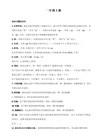
==================分页=======================
Responses to Reviewers
To Reviewer 1:
很多人都遇到过回复审稿人意见的时候。本人曾经因为回复审稿意见不合适而导致拒稿,相当的惨哪!!后来发现回复审稿意见时,除了写清修改内容外,还有一些话是必须要写的。对审稿人的意见提出不同的看法也应该讲究一定的技巧。由于这些话的英文都不难写,所以我直接写成中文表述,觉得有用的虫友自己翻译吧。
首先不论审稿人提了什么意见,你在回复的时候,第一句话一定要说:谢谢您的建议,您的所有建议都非常的重要,它们对我的论文写作和科研工作都具有重要的指导意义!!
如果审稿人的意见明显有问题。那么没办法了,你必须据理力争。但是,你一定不能说:审稿人先生,我认为你的意见是错的!你不必对他的意见发表任何的评论,只需要列出你的理由和证据就可以了,结尾也不要强调你的观点是正确的。简单说就是既不说你对,也不说我对,证据说话。
第五,如果审稿人的评价比较傲慢,而且有失公平。那么,不用客气,直接写信给编辑,痛批审稿人。(我就遇到过这样的情况,痛批后反而被录用。)
意见1:置疑文章的创新性,提出相似的工作已经被A和B做过。
Thank you for pointing this out. A and B’s research groups have done blablablabla. However, the focus of our work is on blablablabla, which is very different from A and B’s work, and this is also the major contribution of our work. We have added the following discussion on this issue in our revised manuscript, see LOA2.
回复审稿意见礼貌用语

回复审稿意见礼貌用语1. 尊敬的审稿专家,您的意见就像一阵及时雨,浇灭了我不少疑惑的小火苗,我定当全力以赴修改。
2. 审稿老师呀,您的眼光如同X光般犀利,指出的问题一针见血,我这就像勤劳的小蜜蜂一样去修正。
3. 亲爱的审稿人,您的建议简直是黑暗中的灯塔,照亮了我前行的路,我肯定马不停蹄地按照您说的改。
4. 尊敬的专家,您的评审意见好似孙悟空的金箍棒,一下子就把我的不足之处给打出来了,我会好好改进,绝不做那顽固的妖怪。
5. 审稿老师,您的眼光比老鹰还敏锐,发现的问题如同天上繁星一样清晰,我会一颗一颗把它们解决掉。
6. 亲爱的审稿专家,您的意见如同一记重锤,把我那些迷糊的想法都敲醒了,我这就重新打造一篇更好的文章。
7. 尊敬的审稿人,您的话就像魔法咒语,点出了文章的问题,我现在就像中了魔法的小木偶,乖乖听话去修改。
8. 审稿老师呀,您的评审如同照妖镜,让文章中的小瑕疵无处遁形,我得赶紧把这些小妖怪都收服了。
9. 亲爱的审稿专家,您的建议像超级英雄的信号弹,给我指明了修改的方向,我要像超级英雄去拯救世界一样去完善文章。
10. 尊敬的专家,您的意见像一把锋利的手术刀,精准地切割出文章的病灶,我这个小医生要赶紧进行治疗了。
11. 审稿老师,您指出的问题如同一串鞭炮,噼里啪啦地在我耳边炸响,我现在就清醒地去处理了。
12. 亲爱的审稿人,您的眼光似能看穿一切的透视眼,发现的问题让我惊叹,我会像建筑工人修补大厦漏洞一样去修订。
13. 尊敬的审稿专家,您的建议仿佛是打开宝藏的钥匙,让我知道如何让文章变得更有价值,我要赶紧挖掘这宝藏了。
14. 审稿老师呀,您的评审意见像一阵狂风,把我那些不扎实的论述都吹得摇摇欲坠,我得像加固房屋一样把它筑牢。
15. 亲爱的审稿专家,您的话就像紧箍咒一样,让我对文章的问题不敢忽视,我这就踏上修正的取经路。
16. 尊敬的审稿人,您的意见如同一把大火,把我文章中的一些杂草都烧光了,我要重新种上美丽的花朵。
审稿意见回复模板

审稿意见回复模板
首先,感谢你对我们的论文提交予以认可,并且给出有关评论与建议。
我们非常重视你的审稿意见,考虑仔细地回复如下:第一,我们非常感谢你提供的深入的思考与研究分析。
你的评论和建议使我们能够提升文章的质量,有效地改进文章,从而使文章更加完整与有意义。
第二,针对你的建议,我们将根据你的有用指示来完善文章内容,加强文章的结构。
我们将根据你提出的问题,在该部分作出进一步的阐述,提出明确的观点,以便能够更好地说明文章的主旨。
第三,对于文章内容的更新,我们将根据文章框架内部进行整合,不断优化,使文章内容更加充实完整,增添可读性,更好地体现文章的主旨。
第四,我们将会尽快处理完成你的审稿意见,并能够在一定时间内完成文章的更新,提交可接受的修订后的版本,并努力清晰地说明文章的主旨。
编辑部期望您对我们提交的论文再次审阅,并能够支持我们投稿审核工作。
再次表示感谢!
- 1 -。
审稿意见回复模板

审稿意见回复模板
尊敬的审稿人:
首先,非常感谢您对我们文档的审阅和提出的宝贵意见。
我们针对您提出的审
稿意见,进行了认真的思考和修改,现将回复如下:
一、对于您提出的文档结构不够清晰的意见,我们已经对文档进行了重新调整
和优化。
我们重新梳理了文档的逻辑结构,对各个部分进行了重新排版和编排,使得整个文档的结构更加清晰明了,便于读者阅读和理解。
二、关于文档中存在的一些细节性错误和不准确之处,我们已经进行了仔细的
校对和修正。
在修改过程中,我们对文档中的数据和信息进行了再次核实,确保其准确性和可靠性。
同时,我们也对文档中存在的一些语言表达不够精准的地方进行了修改,力求用更加准确、生动、简洁的语言表达文意。
三、对于您提出的建议和补充意见,我们也进行了认真的考虑和采纳。
在文档中,我们增加了一些案例分析和实际操作步骤,以便读者更加直观地理解和掌握文档中的内容。
同时,我们也对文档中的一些观点和结论进行了进一步的阐释和补充,以丰富文档的内容和提升其可读性。
最后,再次感谢您对我们文档的审阅和指导。
我们会认真对待您提出的意见和
建议,不断完善和提升文档的质量。
希望我们的修改能够符合您的期待,也期待您能够对我们的文档再次进行审阅,谢谢!
此致。
礼敬!
百度文库文档创作者敬上。
文稿被拒提出意见的回复

文稿被拒提出意见的回复全文共四篇示例,供读者参考第一篇示例:尊敬的编辑:您好!非常感谢您的回复和对我文稿的审阅。
我接受并尊重您的意见,也非常感谢您所给予的建议和指导。
在我接到您的回复后,我对文章进行了仔细的检查和重新修改,希望能够进一步完善它。
我想就您所提出的拒稿原因进行一些思考和回答。
您提到文中内容不够新颖,缺乏独特性,我非常认同您的观点。
在写作过程中,我会努力融入更多个人见解和独特的思考,以使文章更具有个性和独特性。
我会更加注意时事热点和研究领域的最新动态,力求为读者呈现更有价值和创新性的内容。
您指出文章结构不够清晰,逻辑不够严谨,这也是我需要重点改进的地方。
我会更加注重文章结构的设计和修改,确保主题表达清晰、逻辑严密。
我会通过查阅更多相关资料和进行更深入的思考,以保证文章的内容更加准确和完整。
您提到语言表达不够精准,存在错别字和语法错误,这是我在写作中的一个不足之处。
我会加强对语言的重视,更加认真地校对文章,排除所有不规范和错误的表达。
我会多读一些优秀的文章,学习其中的表达方式和技巧,提高我自己的写作能力。
我想感谢您的批评和建议,这对我来说是一次宝贵的学习机会。
我会认真对待您提出的各项意见,不断努力提高自己的写作水平,力求在未来的创作中更加优秀和精彩。
期待今后能够有更多机会和您合作,不断成长和进步。
再次感谢您对我文稿的审阅和指导,谢谢您的耐心和支持!希望我们以后有更多的交流和合作机会。
祝愿您工作顺利,万事如意!最诚挚的问候,【您的名字】第二篇示例:尊敬的编辑部:非常感谢您抽出时间对我们提交的文稿进行审阅。
尽管我们的文稿被拒绝,但我们依然感到非常荣幸能够得到您的专业意见和建议。
经过仔细思考和讨论,我们认为您的审阅意见对我们的文稿进行改进非常重要。
我们理解您对文稿内容的指出不足之处所提出的批评。
在阅读您的审阅意见后,我们意识到在文稿中有一些地方确实存在不足之处,比如逻辑不够清晰、结构混乱、表达不够准确等问题。
文稿被拒提出意见的回复

文稿被拒提出意见的回复全文共四篇示例,供读者参考第一篇示例:尊敬的编辑先生/女士:您好!非常感谢您抽出宝贵的时间阅读我所提交的文稿,并给予宝贵的意见和建议。
我很感激您对我的作品进行了认真的审阅和评论,也感谢您对我文章中存在的问题提出了意见。
在您的回复中,您提到了文章中存在的一些问题和不足之处,我非常感谢您对我的文章进行了客观而中肯的指正。
您指出了文章的论点不够清晰,逻辑不够严谨,表达不够流畅等问题,这些确实是我需要反思和改进的地方。
对于文章的论点不够清晰这一问题,我会在后续的修改中进一步明确文稿的中心思想和主题,以确保读者能够清晰地把握到我想表达的观点和观念。
我会在逻辑结构上进行调整,以确保文章的论证过程更加连贯和严密,让读者能够更容易地理解文章的观点。
对于您提出的表达不够流畅的问题,我会在写作过程中更加注重语言的运用和表达的准确性,尽可能避免冗长累赘的文字和词藻浮夸的修辞,力求用简洁明了的语言表达自己的想法,使读者能够更加直接地理解文章内容。
您还提到了一些具体的建议和改进建议,比如增加实例分析、加强论据支撑等。
我会认真考虑并采纳您的建议,在后续的写作中努力提升自己的写作水平,增加对实例的运用和论据的支撑,以使文章的论证更加具有说服力和可信度。
再次感谢您给予我宝贵的意见和建议。
我会认真对待您的指导,努力改进自己的写作技能,在后续的写作中不断提升自己的学术水平和写作能力,以能够更好地满足您对我的作品的要求和期待。
希望在未来的写作中,能够得到您更多的指导和支持。
期待能够有机会再次向您展示我的进步和成长。
再次感谢您的悉心指导!此致敬礼作者【您的名字】第二篇示例:尊敬的编辑,您好!我是某某,今天收到了您的回信,对我的文稿进行了拒绝。
在此我想就您给予的意见进行回复,希望能够获得您的再次考虑和指导。
我非常感谢您抽出时间阅读我的文稿并给予反馈意见。
在看到您的拒绝回复时,我首先进行了自我反思,并认真考虑了您提出的建议。
文稿被拒提出意见的回复
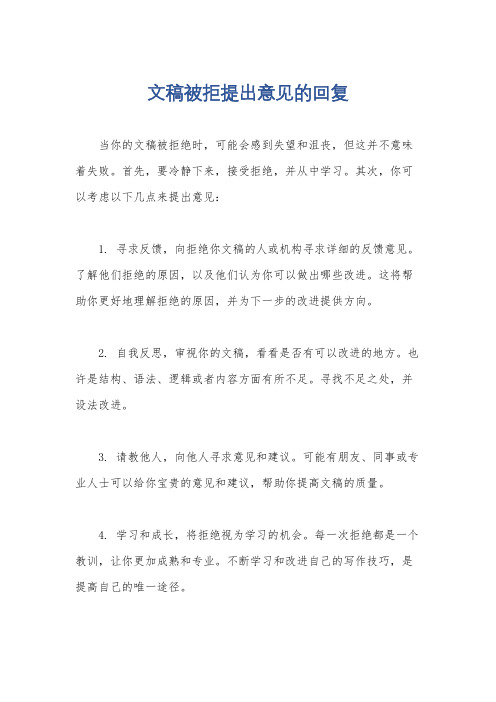
文稿被拒提出意见的回复
当你的文稿被拒绝时,可能会感到失望和沮丧,但这并不意味着失败。
首先,要冷静下来,接受拒绝,并从中学习。
其次,你可以考虑以下几点来提出意见:
1. 寻求反馈,向拒绝你文稿的人或机构寻求详细的反馈意见。
了解他们拒绝的原因,以及他们认为你可以做出哪些改进。
这将帮助你更好地理解拒绝的原因,并为下一步的改进提供方向。
2. 自我反思,审视你的文稿,看看是否有可以改进的地方。
也许是结构、语法、逻辑或者内容方面有所不足。
寻找不足之处,并设法改进。
3. 请教他人,向他人寻求意见和建议。
可能有朋友、同事或专业人士可以给你宝贵的意见和建议,帮助你提高文稿的质量。
4. 学习和成长,将拒绝视为学习的机会。
每一次拒绝都是一个教训,让你更加成熟和专业。
不断学习和改进自己的写作技巧,是提高自己的唯一途径。
5. 重新提交或寻找其他机会,在经过反思和改进后,你可以考虑重新提交你的文稿,或者寻找其他适合的机会。
不要因为一次拒绝就放弃,坚持不懈是成功的关键。
总之,当你的文稿被拒绝时,不要气馁,而是要以积极的态度面对,从中吸取经验教训,不断完善自己,相信你的努力终将会得到回报。
论文投稿前的审稿人意见回应技巧
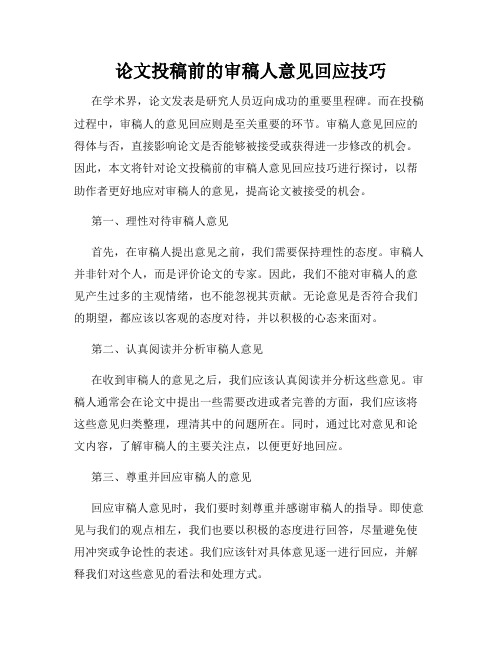
论文投稿前的审稿人意见回应技巧在学术界,论文发表是研究人员迈向成功的重要里程碑。
而在投稿过程中,审稿人的意见回应则是至关重要的环节。
审稿人意见回应的得体与否,直接影响论文是否能够被接受或获得进一步修改的机会。
因此,本文将针对论文投稿前的审稿人意见回应技巧进行探讨,以帮助作者更好地应对审稿人的意见,提高论文被接受的机会。
第一、理性对待审稿人意见首先,在审稿人提出意见之前,我们需要保持理性的态度。
审稿人并非针对个人,而是评价论文的专家。
因此,我们不能对审稿人的意见产生过多的主观情绪,也不能忽视其贡献。
无论意见是否符合我们的期望,都应该以客观的态度对待,并以积极的心态来面对。
第二、认真阅读并分析审稿人意见在收到审稿人的意见之后,我们应该认真阅读并分析这些意见。
审稿人通常会在论文中提出一些需要改进或者完善的方面,我们应该将这些意见归类整理,理清其中的问题所在。
同时,通过比对意见和论文内容,了解审稿人的主要关注点,以便更好地回应。
第三、尊重并回应审稿人的意见回应审稿人意见时,我们要时刻尊重并感谢审稿人的指导。
即使意见与我们的观点相左,我们也要以积极的态度进行回答,尽量避免使用冲突或争论性的表述。
我们应该针对具体意见逐一进行回应,并解释我们对这些意见的看法和处理方式。
第四、合理解释修改措施和改进结果在回应审稿人意见的同时,我们需要详细解释我们对于修改措施和改进结果的考虑。
我们应该清晰地回答审稿人关心的问题,说明我们对于审稿人意见的采纳与处理,并且指出我们的更新和改进对于整篇论文的提升。
第五、修订论文并做出合理的改动根据审稿人的意见和我们自身的理解,在回应审稿人的同时,我们也应该对论文进行适当的修改和完善。
我们需要全面考虑论文质量和可读性,确保修改后的论文更符合审稿人和读者的期望。
在对论文进行修订时,我们应该尽量遵循学术规范和规则,确保论文的可信度和科学性。
综上所述,回应审稿人意见是论文投稿过程中不可忽视的重要环节。
文稿被拒提出意见的回复

文稿被拒提出意见的回复
当你的文稿被拒之后,提出意见是非常重要的。
首先,你需要
认真阅读编辑或评审人员给出的拒稿意见,理解他们对你的文稿有
哪些具体的意见和建议。
这些意见可能涉及到文稿的结构、内容、
论证方式、语言表达等方面。
在阅读意见的过程中,要保持冷静,
不要因为拒稿而产生情绪化的反应。
其次,你可以考虑与编辑或评审人员进行沟通,进一步了解他
们的意见和建议。
你可以就拒稿意见中提出的问题向他们请教,寻
求更具体的解释和指导。
这种沟通有助于你更好地理解他们的观点,为你修改文稿提供更明确的方向。
另外,你也可以寻求他人的意见,尤其是那些在相关领域有经
验的人士。
他们可能会从专业角度给出宝贵的建议,帮助你找到改
进文稿的方法。
此外,不要忽视自身的反思和总结。
反思自己的文稿,在拒稿
意见的指导下,审视文稿中可能存在的问题,思考如何进行修改和
完善。
这个过程可能需要花费一些时间,但是对于提高文稿质量是
非常有益的。
最后,要保持乐观的心态。
拒稿并不意味着你的文稿没有价值,而是一个改进的机会。
接受拒稿意见,努力改进你的文稿,相信你
会取得进步。
在这个过程中,坚持不懈,相信自己,相信自己的努
力会有所回报。
总之,当你的文稿被拒之后,提出意见是非常重要的。
通过认
真阅读拒稿意见、与编辑或评审人员沟通、寻求他人意见、反思总
结以及保持乐观的心态,你可以更好地应对拒稿,并且提升你的文
稿质量。
- 1、下载文档前请自行甄别文档内容的完整性,平台不提供额外的编辑、内容补充、找答案等附加服务。
- 2、"仅部分预览"的文档,不可在线预览部分如存在完整性等问题,可反馈申请退款(可完整预览的文档不适用该条件!)。
- 3、如文档侵犯您的权益,请联系客服反馈,我们会尽快为您处理(人工客服工作时间:9:00-18:30)。
冷静应对拒稿:如何回复审稿意见已有 5979 次阅读2010-1-7 11:54|个人分类:未分类|系统分类:论文交流|关键词:拒稿,审稿意见,学术论文,英语论文,论文写作,理文编辑Dr. Daneil McGowan论文写作系列第十讲——Responding to peer reviewers: dealing with rejectionDr. Daneil McGowan 论文写作系列的中文版本终于与大家见面了,希望大家继续支持!译文见下方。
Your papers will sometimes be rejected. It is inevitable. The percentage of papers that is accepted and published without the need for any revisions is very small, and even the best scientists, writing up the best science, will face rejection from journals or the need to make revisions before their paper is considered acceptable for publication. Rather than thinking of rejection from your target journal and requests for major revisions as a negative experience, it is important to realize that this is an integral part of the publication process that exists to make your paper as robust and compl ete as possible before it joins the ‘collective knowledge’ as part of the literature.There are many different possible reasons for rejection from a journal, and most of these have been described in previous tips in this tips series. For example, if you submitted your manuscript to an inappropriate journal it is likely you will receive a rejection letter without the paper even being sent to review. By selecting an appropriate journal (see tip on journal selection) you will increase the chances that your manuscript will be sent out for review. Similarly, a poor cover letter might result in immediate rejection without review, so submitting your manuscript with a good cover letter is essential (see tip on cover letter development). Failure to follow the instructions set out in the target journal’s Guide for Authors is another possible reason for rejection and considered insulting to the journal editors, although it is likely that you will simply receive an invitation to resubmit in the correct format. Other reasons for rejection include flawed study design, poor written language, inappropriate or incompletely explained methodology or statistical tests, incorrect description or overstatement of results, lack of balance or detail in the introduction and/or discussion, or simply a lack of novelty (for example, if your study simply repeats something that has already been done before), significance or relevance. By critically analyzing your paper prior to submission, and considering all of the items that peer reviewers will look at, you will hopefully be able to identify any problems in advance. By following the advice in the tips in this tips series, youwill speed up the process from initial submission to publication and make the stages in between considerably less stressful. Therefore, it is worthwhile getting your paper into the best possible form before submitting it anywhere to minimize the likelihood of rejection.In considering peer review and how to address it, it is helpful to think about how a peer reviewer would have approached your paper. Different journals will ask different things of peer reviewers, but in general they will be checking for the following aspects of good science and scientific writing, and asked to comment whenever any of these criteria are not satisfactorily met in the submitted manuscript:Significance∙What is the importance of the findings to researchers in the field?∙Are the findings of general to interest to researchers in related and broader fields?Novelty∙Are the claims in the paper sufficiently novel to warrant publication?∙Does the study represent a conceptual advance over previously published work?Introduction∙Does the introduction provide sufficient background information for readers not in the immediate field to understand theproblem/hypotheses?∙Are the reasons for performing the study clearly defined?∙Are sufficient and appropriate references cited to justify the work performed?∙Are the study objectives clearly defined?Methods/Technical rigor∙Are the methods used appropriate to the aims of the study?∙Is sufficient information provided for a capable researcher to reproduce the experiments described?∙Are any additional experiments required to validate the results of those that were performed?∙Are there any additional experiments that would greatly enhance the quality of this paper?∙Are appropriate references cited where previously established methods are used?Results/Statistics∙Are the results clearly explained and presented in an appropriate format?∙Do the figures and tables show essential data or are there any that could easily be summarized in the text?∙Is any of the data duplicated in the graphics and/or text?∙Are the figures and tables easy to interpret?∙Are there any additional graphics that would add clarity to the text?∙Have appropriate statistical methods been used to test the significance of the results?Discussion∙Are all possible interpretations of the data considered or are there alternative hypotheses that are consistent with the available data?∙Are the findings properly described in the context of the published literature?∙Are appropriate references cited in meeting the above criterion?∙Are the limitations of the study discussedConclusion∙Are the conclusions of the study supported by appropriate evidence or are the claims exaggerated?∙Are the significance/applicability/implications of the findings clearly discussed?Literature cited∙Is the literature cited balanced or are there important studies not cited, or other studies disproportionately cited?Journal selection∙Is the target journal appropriate?Language∙Is the manuscript clearly written so as to be understandable by researchers not in the immediate field?When you receive a letter of rejection and peer review reports from the journal editor it is important that you carefully study all of the comments (from the editor as well as the reviewers), address these in your manuscript as appropriate, and prepare a detailed response. It is usual to return a revised manuscript and response letter (it is also acceptable to separate the cover letter and responses into different files), and these normally need to be returned within a set period of time or the revised manuscript will be considered as a new submission. It is essential that you respond to all of the points made by the editor and/or reviewers, even if you disagree with them. If you do disagree with a point that has been made, you should provide a polite and scientifically solid rebuttal. This might take the form of a reference to a particular paper that supports your statement (such a paper might need to be added to the reference list of your manuscript if it isn’t already cited), an explanation of why an experiment was performed in a particular way, or an explanation of why you didn’t perform additional experiments recommended by the reviewer. Whatever you do, do not ignore or overlook comments, because this will only lead to delays. Your paper will not be published until all comments are appropriately addressed.The best format for a response letter is to paste in the comments made by the editor and reviewers and write your response beneath each comment. Use different font styles (for example, normal and italics) to differentiate comments from responses. When referring to changes in the text provide the page and line numbers so that these changes can quickly be identified. Copy the new or modified text into the letter so it is immediately clear how your changes address the comment. It is also usual to distinguish major changes in the text in some way, for example, with yellow highlight and/or underline and strikethrough fonts, to make them easy to identify. Finally, if additional analyses or experiments are required to satisfy the editor or reviewers, you should perform them and add the data to your manuscript; these serve to make the final paper stronger and will increase the chances of eventual publication.ExampleChecklist1.Don’t take rejection personally; the object is to make your paperstronger and more reliable2.Address all points raised by the editor and/or reviewers by revisingthe manuscript and showing the changes in your letter3.Perform any additional experiments or analyses requested unless youfeel that they would not add to the strength of your paper (in which case you should provide a rebuttal)4.Provide a polite and scientifically solid rebuttal to any pointsor comments you disagree with5.Differentiate comments and responses in the letter file by usingdifferent font styles6.Identify major revisions in the text, made in response to peerreview comments, with highlight, underline and strikethrough fonts7.Return the revised manuscript and response letter within therequested time period to avoid your paper being treated as a new submission。
